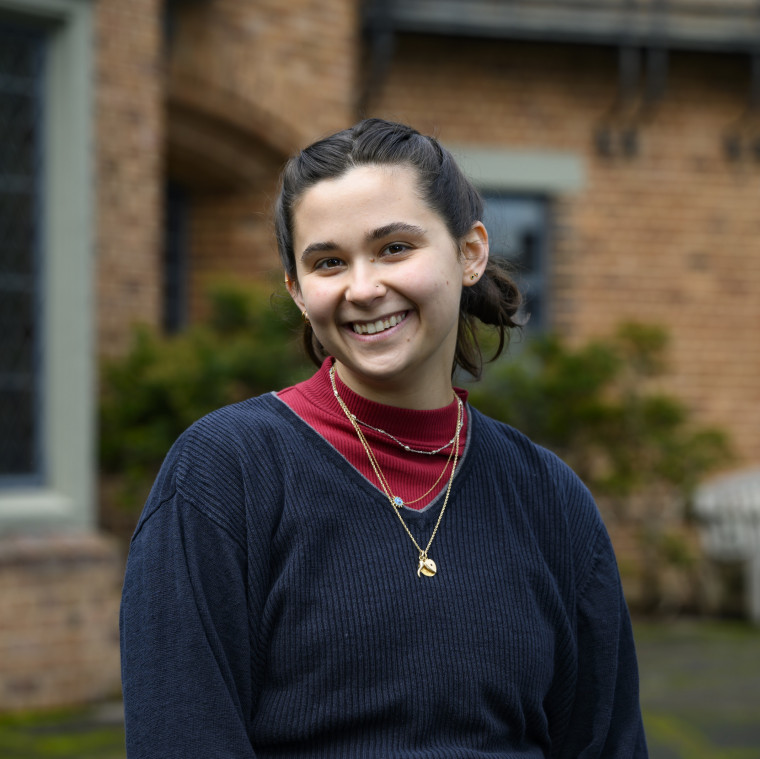Julia Salomone

Pronouns
Degree and Class Year
Hometown
Major
Minor
Extracurriculars
Overseas study
What three words would you use to describe L&C?
What’s your favorite class? Why?
My favorite class has been Feminist Theory with Associate Professor Kimberly Brodkin. It is the final class for the minor, and ends up being relatively small, so everyone gets close. The class became a safe space for me. I knew I could pose any question or curiosity to the group, and that our professor would always welcome respectful debate.
What made you want to come to Lewis & Clark?
The liberal arts education was super exciting to me, especially because I knew I wanted the opportunity to learn from different departments beyond my major. I wanted room in my schedule to take an art class, or even yoga as my physical education. I also knew that studying abroad was a priority for me, and knowing that 60 percent of Lewis & Clark students go abroad made me feel confident in my decision.
What do you like or find most interesting about your major?
I appreciate that in the environmental studies major we have our core classes, but are also required to take a number of classes in other areas. I was able to take classes in sociology, philosophy, religious studies, biology, and more because of the way the major is structured. I feel grateful for the opportunity to explore and apply the curriculum at a number of intersections, because no area of study is limited to one application or career path.
What do you like or find most interesting about your minor?
As a gender studies minor, I was able to find solace in a tight-knit community full of compassionate and excited individuals ready to learn. I was so grateful for my professors, especially Andrea Hibbard and Kimberly Brodkin, who opened my eyes and ears to so many opportunities in the gender studies world.
Tell us about your support systems and social outlets on campus: people, activities, clubs, res halls, etc.
I consider myself lucky because I met my best friend on my second day here, and live with her to this day! I found my people by getting involved in the areas of school I’m interested in. For example, my first year I applied to be a sexual health and consent peer educator and became involved in the most awesome group of people I had ever met. I continue to work with this program, along with the Gender Studies Symposium, where I never fail to meet the most interesting and like-minded people.
What advice do you have for incoming students?
GET INVOLVED! Sign up for every club, you’ll only end up staying in one or two but you don’t even know where your interests will fall. Interested in ecology? We have a literal beekeeping club. What about restorative justice? We have a prison abolitionist club! There are so many opportunities to meet people who are just as excited as you are.
Have you been involved with one of our symposia, as an organizer or participant? What was the experience like? How did the event complement your academic experience?
I am currently the cochair of the Gender Studies Symposium, and it has really solidified my academic and professional interests in the gender studies field. Our theme this year is science and medicine at the intersection of gender, which related to my academic (and personal) research in maternal health, reproductive healthcare, and gender more broadly. Chairing the symposium while simultaneously writing my thesis on reproductive health has empowered me to look beyond the classroom and explore my interests further.
More Admissions Stories
Admissions is located in Frank Manor House on the Undergraduate Campus.
MSC: 32
email admissions@lclark.edu
voice 503-768-7040
fax 503-768-7055
Vice President of Admissions and Financial Aid
Eric Staab
Admissions
Lewis & Clark
615 S. Palatine Hill Road MSC 32
Portland OR 97219

